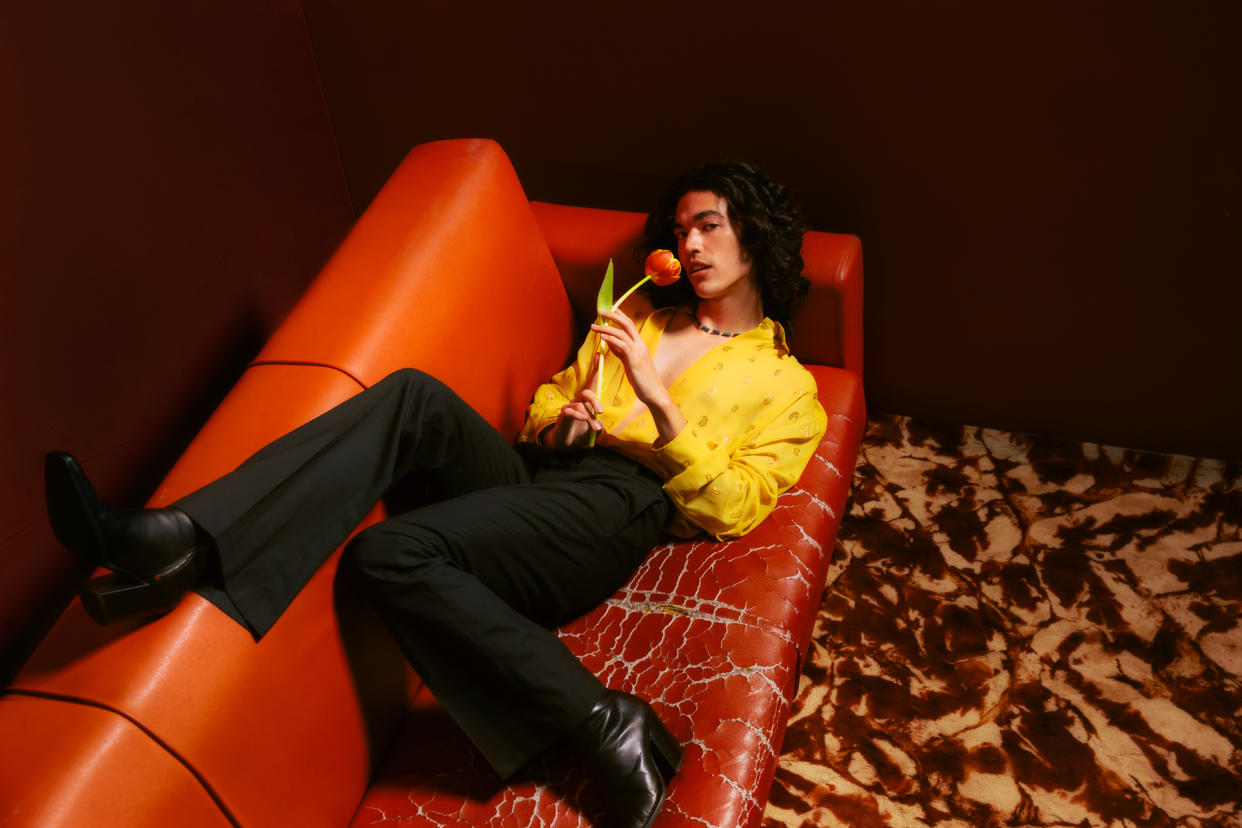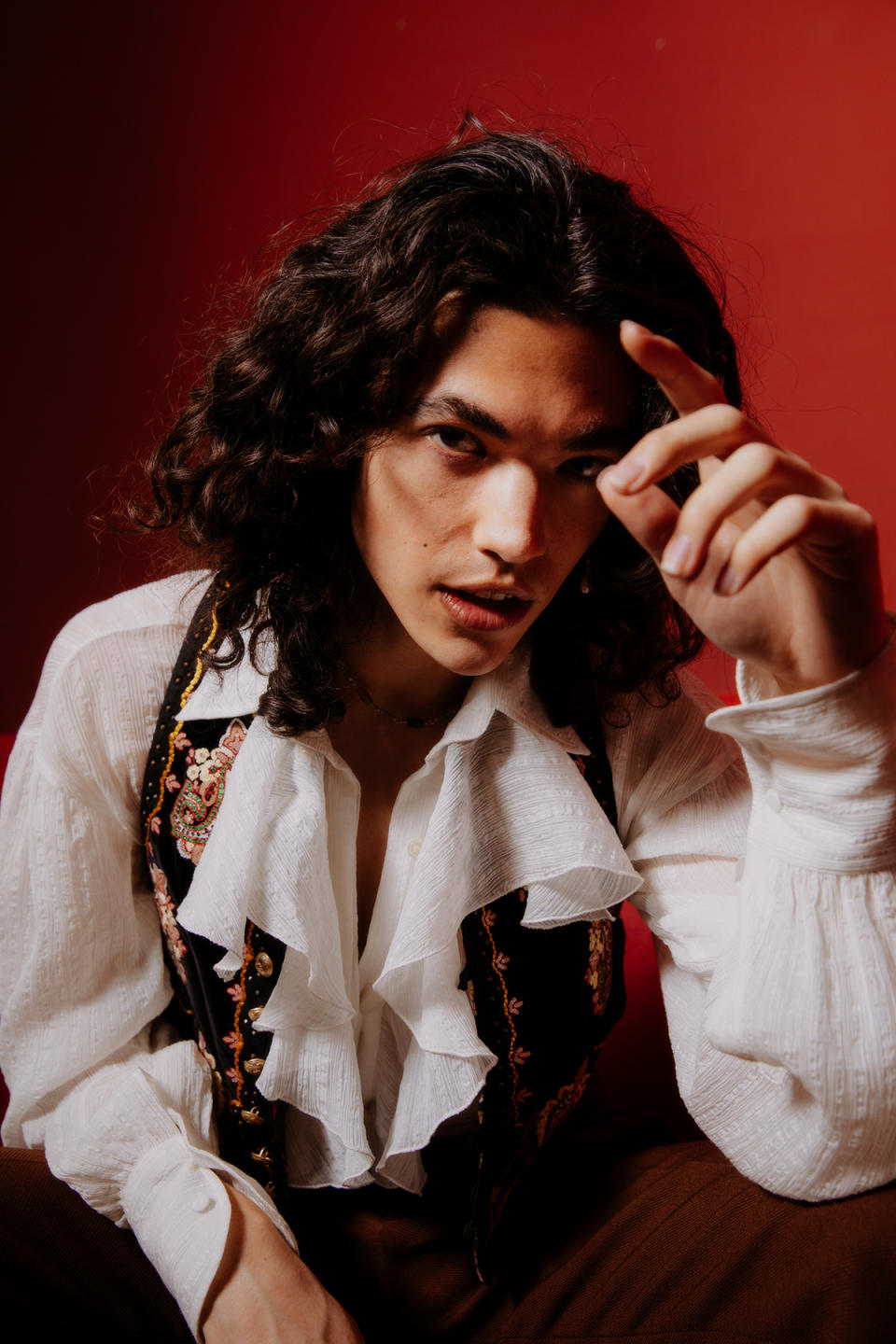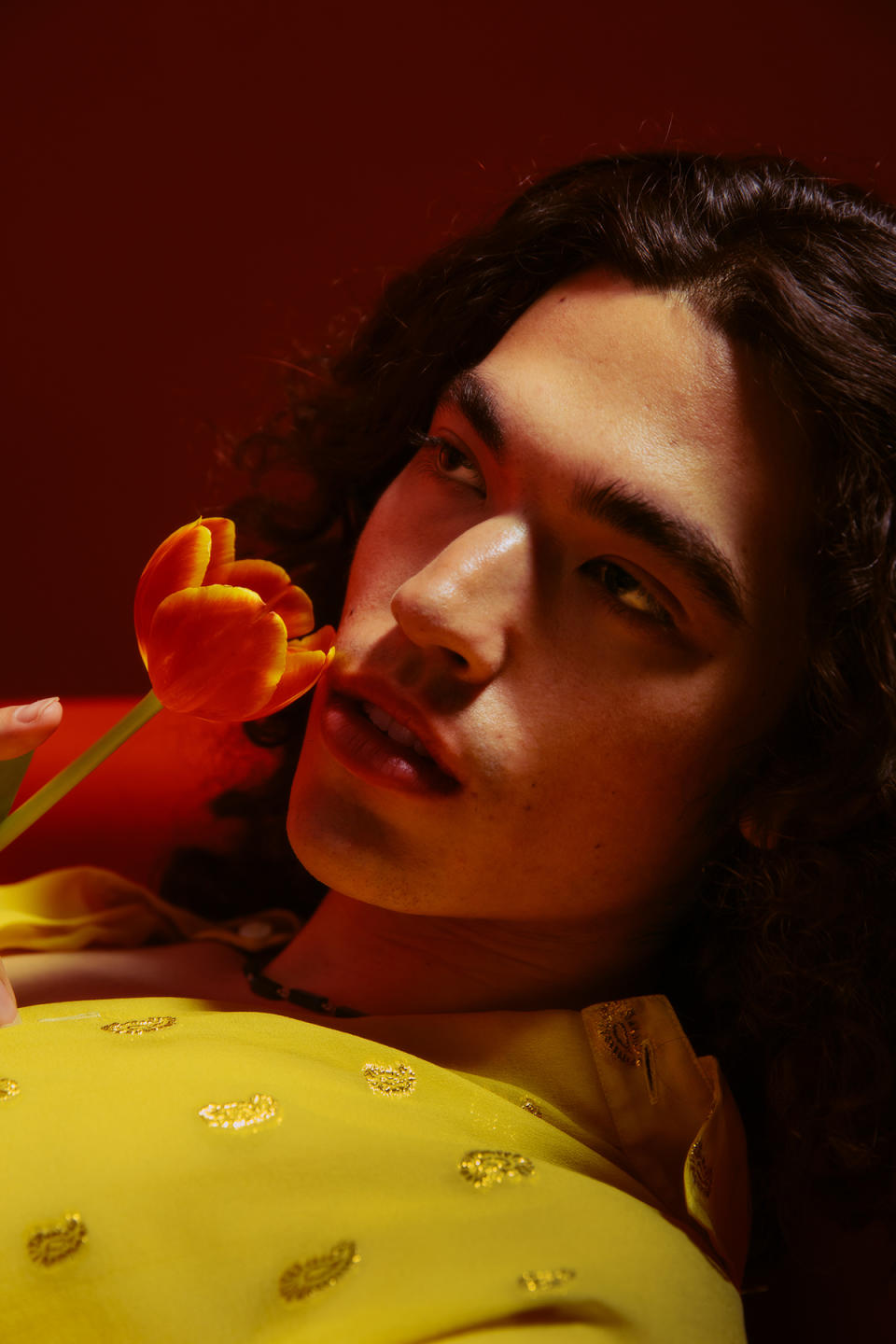How Conan Gray Became Pop’s Oversharing Next Big Thing

- Oops!Something went wrong.Please try again later.
Conan Gray says he’s always been a watch-from-the-sidelines kind of guy. A “non-participator,” as he puts it, the kind of person who lives vicariously through those around him. “I just watch people,” he says with a shrug, sipping a cold brew (no milk, no sugar) outside of his favorite coffee shop in L.A.’s Eagle Rock neighborhood. “I feel like I’m just an observer of life.”
“Non-participator” seems like a weird way for this particular 23-year-old to describe himself. We’re talking about a platinum-selling pop star who just put on a captivating set in the blazing desert sun on Coachella’s main stage, then walked down the Met Gala red carpet in an angelic Valentino outfit that matched his delicate and gender-fluid fashion.
More from Rolling Stone
Conan Gray's Second Album 'Superache' Is About That Pain That Lingers for Years
Conan Gray Details the Downfall of a Toxic Relationship on 'Jigsaw'
Four Tet Wins Higher Royalty Rate After Settling Legal Battle With Domino Records
But, chatting with Gray — today wearing a black bomber jacket over a thrifted baseball tee, and black sunglasses in his hair to keep the curls out of his eyes — you get a sense of why he’s seen his life that way. Maybe it’s some impostor syndrome kicking in for the Japanese-American Swiftie, who survived a tough childhood in Middle of Nowhere, Texas, that could’ve easily halted his dreams of becoming, well, anything. Or perhaps it’s that Gray reached a new level of fame during a pandemic (his debut, Kid Krow, came out in March 2020) that rewarded him for, as he puts it, “just sitting in bed.”
Sitting in bed is rapidly becoming less of an option these days, since Gray is poised for big things this year. He’s a songwriter with a penchant for brutal honesty and a natural ability to connect to a young generation of overthinkers. But Kid Krow was a mere introduction to the intricacies of a boy trying to navigate the mysteries of young love. (Up until a few months ago, he says, he “didn’t really date.”) Due June 24, his excellent new album, Superache, goes deeper. It acknowledges his romantic failure, rips apart the monthslong sulk that followed it, and opens up like never before about his childhood. “Writing this album was miserable, and that’s why it ended up being a super-accurate depiction of my life,” he says. “It felt like scraping my ribs of any last bits of meat.”
The album marks a shift from the simple and angsty lyricism of his debut. “With Kid Krow, I was very much like, ‘Hi, I am Conan, nice to meet you. These are some things that happened. My heart has been broken before, when I was a teenager,’” he says, shaking an invisible hand. “But then with this album, it’s like, ‘I had a really bad childhood. I’m in a lot of pain,’” he says in a deep old-man voice, before letting out a giggle.
That childhood was filled with volatility. Gray was born in Southern California, but soon his mother moved the family to her native Japan to care for her ailing father. His dad’s military career sometimes kept him apart from the family, and when Conan was three, not long after the family returned to the States, his parents divorced. Following the split, Gray and his sister divided their time between his parents. He moved “about a billion” times, as he said in a 2016 video, sharing tiny apartments with his sister and mom; the trio once even shared a queen-size bed. In school, Gray was often bullied by his mostly white classmates, sometimes for his mixed-race identity.
Inspired by “childhood trauma and generational trauma,” and his rough upbringing, Gray wrote “Family Line,” the centerpiece of Superache. “It felt like something I needed to say to build a true representation of who I am,” he tells me. “And the fact that I didn’t have the best childhood is not something that I’m afraid to talk about to my friends. I wasn’t going to put it on the album at all, but I ended up playing it for some people and it ended up being all of their favorites. I felt like I kind of owed it to the people who listened to the songs to be honest about my life.”
Gray says he’s terrified for the world to hear “Family Line,” but “music isn’t supposed to make you feel comfortable all the time,” he says. “I think that’s why I decided to put it on [the album], because I do feel a bit alone sometimes in my life and in my past. I think it’s hard to find people that I relate to when it comes to having a rough childhood. I felt like it was important to say.” (“Family Line” includes lyrics about domestic abuse, though Gray has not confirmed that they apply specifically to his family.)
For Gray, writing is coping. And it helped to have someone like producer Dan Nigro — who worked on Gray’s debut album and produced Olivia Rodrigo’s smash-hit debut, Sour — by his side. “He’s been a bit of a mentor or a dad to me,” Gray says of the producer.

Photograph by Justin J Wee for Rolling Stone. Shirt and vest by Etro. Pants: Vintage. Jewelry by Presley Oldham.
Nigro was the first person to invite Gray, then a YouTuber who posted from his childhood bedroom and briefly from his UCLA dorm room, into a real studio. “He told me he had never sung on a microphone on a mic stand,” Nigro says. “I’ve never dug in with somebody from the ground up, and it’s been one of the most rewarding experiences of my life. Whenever he brings an idea, it feels distinctly him, and I can help bring it out in the best way possible. His DNA is so specific.”
There’s another part of his past Gray has been thinking long and hard about recently: his relationship with the internet. In high school, he built a devoted following on YouTube by sharing self-edited drawing videos, life updates, and clips of himself playing the ukulele. His tweets were often streams of consciousness, reflective of a carefree, oversharing Gen Zer.
As a high school senior, Gray released his first song, “Idle Town,” and its DIY video, a nostalgic ode to the stillness of his hometown and the close friends he made there, laced with a yearning hope to get out. Just a quarter into UCLA, he’d leave school, sign to Republic Records, and release his EP, Sunset Season. Then came Kid Krow and the rise of “Heather,” about envying a girl who was just too perfect, which went two-times platinum and became an anthem for a generation of young adults (and TikTok addicts) just like him.
But as the song blew up during the summer of 2020, the internet suddenly became a dark place for Gray: Trolls fabricated a rumor that he had worn blackface, others resurfaced a video from a 13-year-old Conan saying he “looked Mexican” because of a dark tan, and some criticized his use of emojis that they deemed didn’t match his skin color.
Gray would address the backlash in a Twitter thread in July 2020, accepting responsibility for some of the things he had said as a tween while also acknowledging that some things were just untrue. Since then, Gray has stayed mostly absent from digital life (or at least from Twitter).
“It was a total invasion of my privacy. It was horrifying. That’s when I was like, ‘You really have to take it with a grain of salt and decide what’s going to affect you and what’s not going to affect you,’ because I was letting all of it affect me,” Gray says. “I was going insane. No matter how low, I thought I was just getting kicked further and further.”
Gray says he’s since learned to “really respect” the internet and the “extremely powerful tool” that it can be, but he opts to spend just a few hours on TikTok a day and simply stay quiet. “I’ve really learned to take a step back from the internet and focus on people who purely love you.”
Among those people is his bestie, Olivia Rodrigo. They met in early 2021 and bonded over their adoration for Taylor Swift, the lyrical matriarch Gray once said “raised” him. It was around that time that Swift had her “two kids” share a snippet of her rerecorded “You Belong With Me,” with the two friends re-creating an iconic scene from its video.
Since then, the pair have attended award shows and the Met Gala together, and recently performed a duet to Katy Perry’s “The One That Got Away” during Rodrigo’s Sour tour. But when no one’s watching, their friendship mostly consists of “just ordering a bunch of food and watching movies.”
“I very much value quality over quantity in my life,” Gray says. “With Olivia, she’s someone that I just adore. And it’s always nice to have friends that you can depend on. [Fame] is a very confusing thing, and it’s nice to have people that you can relate to and find comfort in.”
It’s fitting, then, that the fourth track on the album is titled “Best Friend,” dedicated to the core set of besties (including his high school best friend Ashley) with whom he’s surrounded himself throughout his life. “You’re just as psycho as me/Just as sick inside the head/So when they ask, I’ve always said/‘That’s my fucking best friend,’” Gray sings on the sweet, guitar-backed ode.
“I don’t know if it’s super-healthy to depend on your friends as much as I do. It’s really the only way I feel like I’ve made it through anything,” Gray says. “If it wasn’t for my friends in high school I don’t think I would have survived. . . . Obviously, I go to therapy as well, but my friends are everything to me. I call them and I text them and I visit them, and I really rely on them a lot.”

Photograph by Justin J Wee for Rolling Stone. Shirt by Etro. Jewelry by Presley Oldham.
When you’re sipping coffee with someone who writes so well about heartbreak, it’s hard to not tell him about your own. As we talk about his Coachella performance and his flowy, bubblegum-pink outfit, I admit to Gray that I watched his set — and his debut performance of “Memories,” about wanting a former love to stay away and let him heal — while standing next to my own ex. Gray isn’t here for it.
“Why would you do that to yourself? What’s wrong with you?” he yells at me, his voice rising with every word. “You’re a masochist!”
He’s right, and I deserved the scolding. But frankly, we’re in the same boat, Conan! Take “Footnote,” which he wrote after watching Pride and Prejudice for the first time and bawling his eyes out when he realized reality is far from the film’s fictional romance. “It’s about accepting the fact that somebody that I had feelings for didn’t have feelings for me back, and that I was OK with it,” he says of the song, on which he sings, “I’ll just take a footnote in your life/And you could take my body/Every line I would write for you.”
“It’s a little embarrassing realizing you don’t really mean anything to someone that you really, really adore and really, really love and want to care about you,” he says.
In previous interviews, Gray has been candid about the fact that he’s never been in a relationship, but now he shares with me that, since dropping Kid Krow, he’s “had more experience” with love. “Superache is the realization that the reason I’ve been single my whole life is me. It’s my fault,” Gray confesses. “The album is like, ‘Oh, the reason why you’ve been singing this whole time, Conan, is because you’re fucking insane and there’s something wrong with you and you push people away and you’re terrified of commitment and terrified of vulnerability, and you write all these songs and you could never say any of those song topics to somebody’s face.’”
And when it comes to loving, Gray tells me, he’s a “lingerer,” who struggles to let people go, even when the prospect of a relationship is just not there. “I don’t really date, to be honest. . . . Someday I’ll meet someone who will be right. But it hasn’t happened yet,” he says. “And the stories I got along the way were really funny. So that’s what I talk about a lot on the album.”
The only other time Gray dropped an album, the world was entering a state of isolation. “It felt like a very weirdly fitting thing,” Gray says of Kid Krow. “I wrote it sitting in bed. I released the album sitting in bed. And everyone listened to the album while sitting in bed. . . . I didn’t realize how depressed I’d gotten until I went on tour, and I was like, ‘Oh, wait, I was actually really sad.’ It wasn’t normal to be alone for that long.”
This time, the album will drop just a few weeks after wrapping a world tour, where he’s surrounded by real-life human beings who are singing his lyrics back to him, rather than screens and comments from @s on Twitter. “I’m just happy to be out and about and experiencing things,” he says. “I was so afraid when I was younger. I was so afraid of making mistakes and so afraid of getting hurt. And now I’m like, ‘I don’t care if I get hurt. I don’t care if I can get my heart broken or if something’s unpleasant for a day.’ I’m OK with it now. I’m inviting it, because I’d rather feel everything super intensely than feel nothing at all.”
I circle back to what he said earlier about being a “non-participator” — is that really the case when he’s got thousands of eyes on him at each concert, and 6 million or so on Instagram? “I think I’ll always kind of be a watcher rather than a participator. I’m kind of OK with it,” he says. “It’s not something that I think needs to be changed, but I do think now I’m, like, OK with people interfering with my observing.”
A quivery voice approaches our coffee table midconversation. “Sorry to interrupt, but I just wanted to say I love your music,” says a nervous girl, who spotted Gray while walking past the coffee shop. “I saw you at Coachella, and you were amazing.”
I look at Gray, who probably gets this all the time. He hunches his back a little and scrunches his shoulders before thanking the passerby with automatic humility.
“That means the world to me,” he responds, before diving back into our conversation. The self-proclaimed “observer of life” is still getting used to being observed.
This piece appears in Rolling Stone’s annual Hot List, in the July/August issue of the magazine.
Best of Rolling Stone

